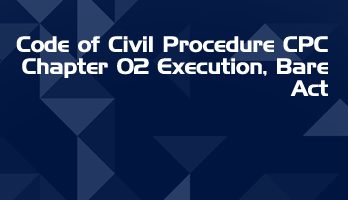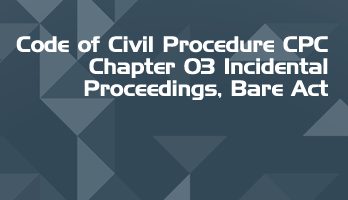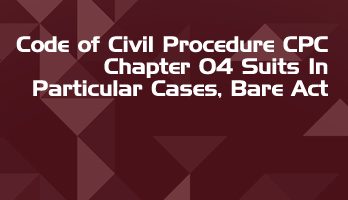Most acts are accompanied by 'subsidiary legislation' such as rules, regulations, notifications and orders; which address the actual implementation detail of the act.
Free Full Course Available on LawMint's YouTube Channel
How to Land Your Dream LLB Internship in a Top Law Firm
- Part 1 - Introduction
- Part 2 - Internship Planning
- Part 3 - Internship Research
- Part 4 - Building Your Profile
- Part 5 - The Email
- Part 6 - The Resume
- Part 7 - The Cover Letter
- Part 8 - The Interview
- Part 9 - Self Development
Practical and comprehensive course, with real examples and step-by-step analysis of the complete internship application process. Check out LawMint's YouTube channel now!
Code of Criminal Procedure, 1973
Chapter 25 – Provisions As To Accused Persons Of Unsound Mind
Section 328 – Procedure in case of accused being lunatic
- When a Magistrate holding an inquiry has reason to believe that the person against whom the inquiry is being held is of unsound mind and consequently incapable of making his defence, the Magistrate shall inquire into the fact of such unsoundness of mind, and shall cause such person to be examined by the civil surgeon of the district or such other medical officer as the Stale Government may direct, and thereupon shall examine such surgeon or other officer as a witness and shall reduce the examination to writing. 1A. If the civil surgeon finds the accused to be of unsound mind, he shall refer such person to a psychiatrist or clinical psychologist for care, treatment and prognosis of the condition and the psychiatrist or clinical psychologist, as the case may be, shall inform the Magistrate whether the accused is suffering from unsoundness of mind or mental retardation: Provided that if the accused is aggrieved by the information given by the psychiatric or clinical psychologist, as the case may be, to the Magistrate, he may prefer an appeal before the Medical Board which shall consist of –
- head of psychiatry unit in the nearest government hospital; and
- a faculty member in psychiatry in the nearest medical college.
- Pending such examination and inquiry, the Magistrate may deal with such person in accordance with the provisions of section 330.
- If such Magistrate is informed that the person referred to in sub – section (1A) is a person of unsound mind, the Magistrate shall further determine whether the unsoundness of mind renders the accused incapable of entering defence and if the accused is found so incapable, the Magistrate shall record a finding to that effect, and shall examine the record of evidence produced by the prosecution and after hearing the advocate of the accused but without questioning the accused, if he finds that no prima facie case is made out against the accused, he shall, instead of postponing the enquiry, discharge the accused and deal with him in the manner Provided under section 330: Provided that if the Magistrate finds that a prima facie case is made out against the accused in respect of whom a finding of unsoundness of mind is arrived at, he shall postpone the proceeding for such period, as in the opinion of the psychiatrist or clinical psychologist, is required for the treatment of the accused, and order the accused to be dealt with as provided under section 330.
- If such Magistrate is informed that the person referred to in subsection (1A) is a person with mental retardation, the Magistrate shall further determine whether the mental retardation renders the accused incapable of entering defence, and if the accused is found so incapable, the Magistrate shall order closure of the inquiry and deal with the accused in the manner provided under section 330.
Section 329 – Procedure in case of person of unsound mind tried before Court
- If at the trial of any person before a Magistrate or Court of Session, it appears to the Magistrate or Court that such person is of unsound mind and consequently incapable of making his defence, the Magistrate or Court shall, in the first instance, try the fact of such unsoundness and incapacity, and if the Magistrate or Court, after considering such medical and other evidence as may be produced before him or it, is satisfied of the fact, he or it shall record a finding to that effect and shall postpone further proceedings in the case. 1A. If during trial, the Magistrate or Court of Sessions finds the accused to be of unsound mind, he or it shall refer such person to a psychiatrist or clinical psychologist for care and treatment, and the psychiatrist or clinical psychologist, as the case may be shall report to the Magistrate or Court whether the accused is suffering from unsoundness of mind: Provided that if the accused is aggrieved by the information given by the psychiatric or clinical psychologist, as the case may be, to the Magistrate, he may prefer an appeal before the Medical Board which shall consist of –
- head of psychiatry unit in the nearest government hospital; and
- a faculty member in psychiatry in the nearest medical college;
- If such Magistrate or Court is informed that the person referred to in sub – section (1A) is a person of unsound mind, the Magistrate or Court shall further determine whether unsoundness of mind renders the accused incapable of entering defence and if the accused is found so incapable, the Magistrate or Court shall record a finding to that effect and shall examine the record of evidence produced by the prosecution and after hearing the advocate of the accused but without questioning the accused, if the Magistrate or Court finds that no prima facie case is made out against the accused, he or it shall, instead of postponing the trial, discharge the accused and deal with him in the manner provided under section 330: Provided that if the Magistrate or Court finds that a prima facie case is made out against the accused in respect of whom a finding of unsoundness of mind is arrived at, he shall postpone the trial for such period, as in the opinion of the psychiatrist or clinical psychologist, is required for the treatment of the accused.
- If the Magistrate or Court finds that a prima facie case is made out against the accused and he is incapable of entering defence by reason of mental retardation, he or it shall not hold the trial and order the accused to be dealt with in accordance with section 330
Section 330 – Release of person of unsound mind pending investigation or trial
- Whenever a person if found under section 328 or section 329 to be incapable of entering defence by reason of unsoundness of mind or mental retardation, the Magistrate or Court, as the case may be shall, whether the case is one in which bail may be taken or not, order release of such person on bail: Provided that the accused is suffering from unsoundness of mind or mental retardation which does not mandate in – patient treatment and a friend or relative undertakes to obtain regular outpatient psychiatric treatment from the nearest medical facility and to prevent from doing injury to himself or to any other person.
- If the case is one in which, in the opinion of the Magistrate or Court, as the case may be, bail cannot be granted or if an appropriate undertaking is not given, he or it shall order the accused to be kept in such a place where regular psychiatric treatment can be provided, and shall report the action taken to the State Government: Provided that no order for the detention of the accused in a lunatic asylum shall be made otherwise than in accordance with such rules as the State Government may have made under the Mental Health Act, 1987.
- Whenever a person is found under section 328 or section 329 to be incapable of entering defence by reason of unsoundness of mind or mental retardation, the Magistrate or Court, as the case may be, shall keeping in view the nature of the act committed and the extent of unsoundness of mind or mental retardation, further determine if the release of the accused can be ordered: Provided that –
- if on the basis of medical opinion or opinion of a specialist, the Magistrate or Court, as the case may be, decide to order discharge of the accused, as provided under section 328 or section 329, such release may be ordered, if sufficient security is given that the accused shall be prevented from doing injury to himself or to any other person;
- if the Magistrate or Court, as the case may be, is of opinion that discharge of the accused cannot be ordered, the transfer of the accused to a residential facility for persons of unsound mind or mental retardation may be ordered wherein the accused may be provided care and appropriate education and training.
Section 331 – Resumption of inquiry or trial
- Whenever an inquiry or a trial is postponed under section 328 or section 329, the Magistrate or Court as the case may be, may at any time after the person concerned has ceased to be of unsound mind, resume the inquiry or trial, and require the accused to appear or be brought before such Magistrate or Court.
- When the accused has been released under section 330, and the sureties for his appearance produce him to the officer whom the Magistrate or Court appoints in this behalf, the certificate of such officer that the accused is capable of making his defence shall be receivable in evidence.
Section 332 – Procedure on accused appearing before Magistrate or Court
- If, when the accused appears or is again brought before the Magistrate or Court, as the case may be, the Magistrate or Court considers him capable of making his defence, the inquiry or trial shall proceed.
- If the Magistrate or Court considers the accused to be still incapable of making his defence, the Magistrate or Court shall act according to the provisions of section 328 or section 329, as the case may be, and if the accused is found to be of unsound mind and consequently incapable of making his defence, shall deal with such accused in accordance with the provisions of section 330.
Section 333 – When accused appears to have been of sound mind
When the accused appears to be of sound mind at the time of inquiry or trial, and the Magistrate is satisfied from the evidence given before him that there is reason to believe that the accused committed an act, which, if he had been of sound mind, would have been an offence, and that he was, at the time when the act was committed, by reason of unsoundness of mind, incapable of knowing the nature of the act or that it was wrong or contrary to law, the Magistrate shall proceed with the case, and, if the accused ought to be tried by the Court of Session, commit him for trial before the Court of Session.
Section 334 – Judgment of acquittal on ground of unsoundness of mind
Whenever any person is acquitted upon the ground that, at the time at which he is alleged to have committed an offence, he was, by reason of unsoundness of mind, incapable of knowing the nature of the act alleged as constituting the offence, or that it was wrong or contrary to law, the finding shall state specifically whether he committed the act or not.
Section 335 – Person acquitted on such ground to be detained in safe custody
- Whenever the finding states that the accused person committed the act alleged, the magistrate or Court before whom or which the trial has been held shall, if such act would, but for the incapacity found have constituted an offence,
- order such person to be detained in safe custody in such place and manner as the Magistrate or Court thinks fit; or
- order such person to be delivered to any relative or friend of such person.
- No order for the detention of the accused in a lunatic asylum shall be made under clause (a) of Sub – Section (1) otherwise than in accordance with such rules as the State Government may have made under the Indian Lunacy Act, 1912 (4 of 1912).
- No order for the delivery of the accused to a relative or friend shall be made under clause (b) of Sub – Section (1) except upon the application of such relative or friend and on his giving security to the satisfaction of the Magistrate or Court that the person delivered shall –
- be properly taken care of and prevented from doing injury to himself or to any other person;
- be produced for the inspection of such officer, and at such times and places, as the State Government may direct.
- The Magistrate or Court shall report to the State Government the action taken under Sub – Section (1).
Section 336 – Power of State Government to empower officer in charge to discharge
The State Government may empower the officer in charge of the jail in which a person is confined under the provisions of section 330 or section 335 to discharge all or any of the functions of the Inspector – General of Prisons under section 337 of section 338.
Section 337 – Procedure where lunatic prisoner is reported capable of making his defence
If such person is detained under the provisions of Sub – Section (2) of section 330, and in the case of a person detained in a jail, the Inspector – General of Prisons, or, in the case of a person detained in a lunatic asylum, the visitors of such asylum or any two of them shall certify that, in his or their opinion, such person is capable of making his defence, he shall be taken before the Magistrate or Court, as the case may be, at such time as the Magistrate or Court appoints, and the Magistrate or Court shall deal with such person under the provisions of section 332; and the certificate of such Inspector – General or visitors as aforesaid shall be receivable as evidence.
Section 338 – Procedure where lunatic detained is declared fit to be released
- If such person is detained under the provisions of Sub – Section (2) of section 330, or section 335 and such Inspector – General or visitors shall certify that, in his or their judgment, he may be released without danger of his doing injury to himself or to any other person, the State Government may thereupon order him to be released, or to be detained in custody, or to be transferred to a public lunatic asylum if he has not been already sent to such an asylum: and, in case it orders him to be transferred to an asylum, may appoint a Commission, consisting of a judicial and two medical officers.
- Such Commission shall make a formal inquiry into the state of mind of such person, take such evidence as is necessary, and shall report to the State Government, which may order his release or detention as it thinks fit.
Section 339 – Delivery of lunatic to care of relative or friend
- Whenever any relative or friend of any person detained under the provisions of section 330 or section 335 desires that he shall be delivered to his care and custody, the State Government may, upon the application of such relative or friend and on his giving security to the satisfaction of such State Government, that the person delivered shall –
- be properly taken care of and prevented from doing injury to himself or to any other person;
- be produced for the inspection of such officer, and at such times and places, as the State Government may direct;
- in the case of a person detained under Sub – Section (2) of section 330, be produced when required before such Magistrate or Court, order such person to be delivered to such relative or friend.
- If the person so delivered is accused of any offence, the trial of which has been postponed by reason of his being of unsound mind and incapable of making his defence, and the inspecting officer referred to in clause (b) of Sub – Section (1), certifies at any time to the Magistrate or Court that such person is capable of making his defence, such Magistrate or Court shall call upon the relative or friend to whom such accused was delivered to produce him before the magistrate or Court, and, upon such production the magistrate or Court shall proceed in accordance with the provisions of section 332, and the certificate of the inspecting officer shall be receivable as evidence.
Important Central Acts in Regional Languages
Legislative department website also features regional language versions of several important Central Acts.
Free Full Course Available on LawMint's YouTube Channel
How to Land Your Dream LLB Internship in a Top Law Firm
- Part 1 - Introduction
- Part 2 - Internship Planning
- Part 3 - Internship Research
- Part 4 - Building Your Profile
- Part 5 - The Email
- Part 6 - The Resume
- Part 7 - The Cover Letter
- Part 8 - The Interview
- Part 9 - Self Development
Practical and comprehensive course, with real examples and step-by-step analysis of the complete internship application process. Check out LawMint's YouTube channel now!












